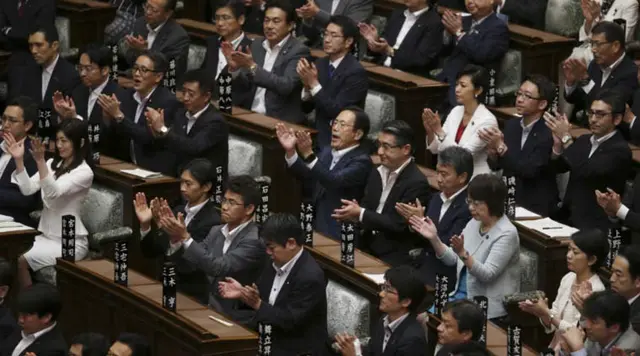As Japan's new security legislation goes into force on Tuesday, the jitters felt by Japan's wartime victims deserve more serious attention.
The ordinary people of Japan and its neighbors are justified to question the motive behind the unpopular legislation, which allows Japan's Self-Defense Forces (SDF) to engage in armed conflicts overseas for the first time since the end of World War II.
Is the controversial legislation a Pandora's box which, when opened, will bring unbridled evil to the region? Or is this merely the act of a benign nation devoted to maintaining peace and stability in a region already stable and at peace?
It is easy to dismiss such worries as reactionary, citing Japan's seven decades of peaceful development and its powerful alliance with its former foe, the United States.
These 70 years of peace, however, have been characterized by an exclusively defensive posture by what was once the region's most aggressive nation. Relations in the region are not broken, so what is the change in its orientation attempting to fix?
The question baffles Japanese people in the same way it does its neighbors. The latest Kyodo News poll found 49.9 percent of respondents are not in favor of the law change, though 39 percent view it in a positive light.
Almost everyone is in agreement that any conflict in the region would be a zero -- or less than zero -- sum game, disastrous for all concerned. But it would be naive to rule out the possibility of ulterior motives.
The nation concerned has a long history of sneak attacks, as was experienced by the survivors of the unprovoked attack on Pearl Harbor, only a generation ago.
With a rightist agenda in the hands of those in power in Japan today, the true motivation behind the new legislation is hard to fathom.
Last August, Japanese Prime Minister Shinzo Abe squandered the opportunity to reconcile his nation with its neighbors when he avoided, yet again, making a full, direct apology for his nation's wartime evils. His administration has even lied to Japan's youngest and most vulnerable,supplying them with text books that gloss over the atrocities by Japanese troops in Nanjing.
How can rubbing salt into the wounds left by WWII and eroding what fragile trust neighbors hold in the country be conducive to regional peace and stability?
The Japanese government's current stance on history is disappointing. And its meddling in the South China Sea issue is overtly questionable.
While hyping the "China threat," it is relocating more and more military resources to the southwestern part of the Japanese archipelago, in addition to strengthening military capabilities and selling weapons to other countries in the region.
From almost every angle, these moves look much more like stoking tensions than the promulgation of peace.
If Japan wants to be a trusted neighbor, then actions by the Japanese government should be more trustworthy. The contribution to regional peace and stability must be clear and incontrovertible. Peace is not just an absence of war; peace is an absence of fear.
An outstanding issue which underlies the Japanese government's security policy and China-Japan relations in general is that Japan's politicians have the incorrect perception of China. Japan's politicians fear China, one of its major trading partners, without reason.
It is time that the Japanese ponder seriously on whether China is a friend or a foe. Will China and Japan be partners or adversaries? The decision is out of China's hands. Enditem
 简体中文
简体中文

